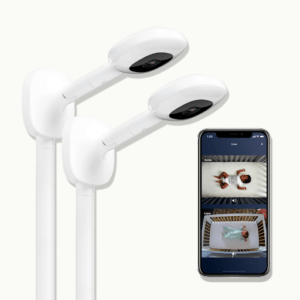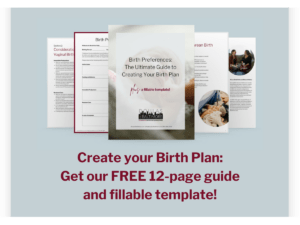Our top positions to try during labor? Childbirth is a process that can last a varied amount of time based on many factors. During labor, the birthing person might need to try a variety of different comfort measures. Even moving between each of these positions can help ease discomfort and be a welcome distraction. We’ve put together a guide on some of our top recommendations complete with variations and things for a support person to consider.
Positions for laboring in bed
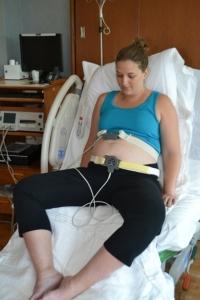
This photo is property of Lamaze International.
Throne
Description: Throne position is a secret weapon of doulas everywhere! This position utilizes the movement of hospital beds to get the laboring person into a comfortable position for resting or waiting. This one is easy to remember, since the very idea of the position is in the name. We’ll be putting our birthing individual on a “throne”.
How to Get There (hospital bed): Have the birthing person sit in the bed. Using the controls on the hospital bed, raise the back up between 45 and 90 degrees. Have the birthing person lean forward for the initial adjustment and lean back to raise or lower the back to a comfortable position. Drop the lower part of the bed all the way to create a “throne”. The goal is a seated position.
Especially Helpful for: After an epidural or medication! This position is perfect for when you’re waiting for dilation but are comfortable enough with medication on board to rest. This is also helpful for getting baby to descend by letting gravity work its magic.
Variations: While this can be great for medicated births, this seated position is also excellent for non-medicated births in other spaces. One notable variation is sitting backwards on the toilet! Since our pelvic floors are trained to relax on the toilet to allow us to use the bathroom, often we’ll use this position to move dilation along. Note: this position can get intense very quickly as baby descends, make sure someone is nearby to help the birthing person off the toilet quickly if needed.
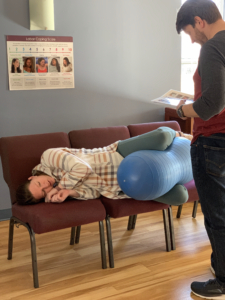
Side Lying
Description: As the name suggests, this position is very simply lying to the side for the birthing person. Another resting position, this helps take the pressure off of the pelvis and back for the birthing individual. We highly recommend a pillow or two between the legs. This one doubles as an excellent pushing position! The top leg can be held by the individual, their birthing partner, a nurse, or a doula to allow the pelvis to open in a more comfortable position.
How to Get There: Simply turn gently to one side or the other! To keep labor moving, a great idea is to move from one side to the other periodically.
Especially Helpful for: This is a great position for early labor, resting after an epidural, or while waiting for pushing urges to emerge.
Variations: Adding a peanut ball or a stack of pillows that brings the upper knee facing upwards is a surefire way to help with dilation and progression of labor. This position is well-loved by our clients who choose medication as it allows them to rest well while laboring down. This can also be used for an unmedicated birth but, just as with the throne position on the toilet, it can get intense very quickly. Ensure someone is nearby in case a shift needs to happen quickly.
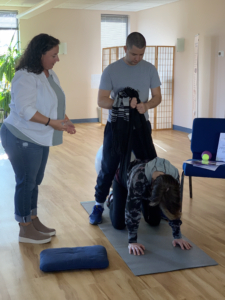
Hands and Knees
Description: Put those arms and legs to work! Laboring on all fours is an excellent way to open the pelvis. This position also could be great for getting baby oxygen and some physicians recommend it for easier positioning of monitors.
How to Get There: Very simply put, this position is fairly simple to get into! In the bed, rotate a little bit at a time with some support on one or both sides. Have someone nearby to move pillows or blankets as needed until the birthing person is in position.
Especially Helpful for: Active laboring! This position is a very active one and gives the birthing person the sensation of doing something instead of being swept away by laboring. Note: this one can get tiring! This is a great position to prepare or “train” ahead of time by lifting light weights or doing movements that strengthen the arms.
Variations: Lean over something to give your arms a rest! Our best suggestions are a stack of pillows, a birthing ball, or the back of the hospital bed. This position could also translate well to water if choosing hydrotherapy with the birthing person leaning over the side of the pool or bath.
Positions for out of the bed
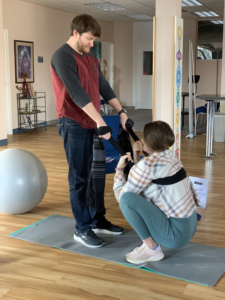
Partner Supported
Description: Lean on me! Standing can get tiring but letting gravity do its job can be very helpful. Enter: partner support! Whether you lean on someone standing in front of you, behind you, or use a bedsheet or rebozo, getting support from someone else can make standing or squatting much easier.
How to Get There: For partner-supported sitting, simply have the partner stand in front of or behind the birthing person to support. It may be helpful for the partner to have their back supported against the wall.
Especially Helpful for: Taking a break from walking or while a contraction is happening.
Variations: Use a bedsheet or rebozo under the birthing person’s arms to offer extra support that is easier to manage for the partner.

Hands and Knees Redux
Description: This position is a great one to do outside of the bed as well! Enjoy all the same benefits of hands and knees in the bed but with more freedom of movement.
How to Get There: Simply sit on the floor swinging legs around and using support to evenly distribute weight onto both hands and knees. Consider putting down a yoga mat or folded up blanket to support the knees and soften the surface.
Especially Helpful for: Active laboring and hip squeezes!
Variations: Lean over a birthing ball or chair to ease the strain on wrists.
Birth is not a one-size-fits-all and your comfort is a top priority. When practicing these positions, take note of what feels comfortable and what feels like too big of a stretch. Remind yourself and your birthing partner that what feels good outside of labor may change very quickly and vice versa. Stay in tune with your body as labor progresses and move naturally. Your body is wise!












